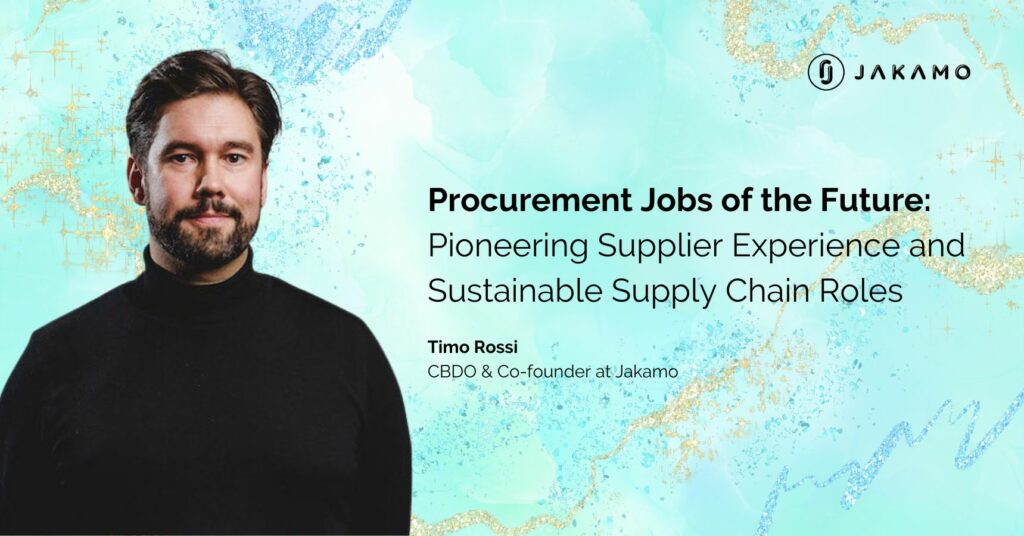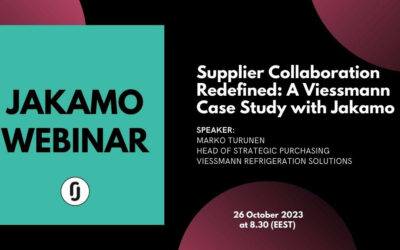Procurement Jobs of the Future: Pioneering Supplier Experience and Sustainable Supply Chain Roles

As the business landscape evolves, procurement is undergoing a transformation from an operational focus to a strategic and collaborative approach. Traditional assumptions that companies are automatically attractive customers to suppliers are being challenged, with a new emphasis on becoming the preferred customer for suppliers. This shift is driven by factors such as the COVID-19 pandemic, geopolitical events like the war in Ukraine, and the general recognition of supply chain dependencies.
Procurement’s increasing importance for company success, especially in the manufacturing industry, necessitates a focus on strategic development and holistic collaboration in supplier relationships. Organizations are realizing the vulnerability of their supply chains, as suppliers now often have the ability to choose which customers they serve. Nowadays, to mitigate risks and strengthen supplier relationships, procurement organizations must ask themselves: “How can we become the preferred customer for our suppliers?”
Besides, Supply Chain Sustainability has emerged as a crucial topic due to political changes, new regulations, shifting investment and loaning environments, and evolving consumer values. What has once been considered a nice-to-have aspect is now an existential must-have strategic target for company management.
Furthermore, technological advancements, such as digital platforms, machine learning, and AI, are reshaping procurement by automating manual tasks and increasing visibility. This leads also to a significant reconfiguration of job descriptions in the field. Procurement professionals can now focus more on strategic and proactive responsibilities, rather than being solely engaged in operational tasks.
In this new era of procurement, the concept of Supplier Experience takes center stage, offering a comprehensive approach that encompasses also supply chain sustainability. By placing emphasis on collaboration, innovation, and mutual success, organizations can cultivate long-term relationships with their suppliers while driving sustainability and resilience throughout the entire supply chain.
Unleashing the Full Potential of Procurement Through Redefined Roles and Responsibilities
Future procurement professionals will require a new set of skills and competencies. They must adopt a generalist mindset with versatile capabilities, emphasizing strategic thinking and proactive decision-making. Understanding the holistic role of suppliers in the company’s overall sustainability, success, and end-customer satisfaction is critical. This shift in focus empowers procurement professionals to significantly contribute to their organization’s strategic objectives and drive positive outcomes in the dynamic business environment.
Future jobs in procurement will align with the changing dynamics and requirements of the industry. Some potential job titles in forefront companies’ procurement include:
- Chief Supplier Experience Officer (CSXO): This role replaces traditional positions like Chief Procurement Officer (CPO) and focuses on creating a positive and collaborative experience for suppliers, developing strategic relationships, and ensuring mutual success to create true end-customer value. The CSXO champions sustainability, collaborating with suppliers to achieve a holistically sustainable supply chain. Leveraging technology and fostering innovation, CSXO streamlines procurement processes, enhances visibility, and drives efficiency in supplier relationships.
- Supplier Experience Designer: Building upon the concept of Supplier Development Engineer, a Supplier Experience Designer is responsible for creating value for end-customers by designing and implementing programs that enhance the overall experience of suppliers, driving sustainability, innovation, and collaboration.
- Supplier Success Manager: This role replaces traditional Category and Supplier Account Managers. Supplier Success Managers manage and nurture supplier relationships, ensuring their success, and aligning their capabilities with the organization’s strategic objectives and end-customer value.
- Supply Chain Sustainability Designer: This role focuses on designing and implementing sustainable practices within the supply chain, optimizing processes, reducing environmental and social impact, and ensuring overall supplier compliance, operative sustainability, and sustainability innovation.
- Supply Chain Resilience Strategist: This role focuses on building resilient supply chains that can withstand disruptions such as natural disasters, geopolitical events, or pandemics. They develop risk management strategies, implement contingency plans, and ensure business continuity across the supply chain.
- Data-driven Procurement Strategist: This role leverages data analytics and business intelligence tools to identify trends, forecast demand, optimize processes, and make data-driven decisions in procurement strategy development. They help the organization gain insights from data to improve sustainability, enhance efficiency, reduce costs, and improve decision-making.
These are just a few examples of potential future job roles in procurement. As the field continues to evolve, new positions may emerge to address the changing needs and priorities of companies in the manufacturing industry.
Timo Rossi, Jakamo
Chief Business Design Officer & Co-founder
This article has been published originally at Supplier Experience – Jakamo’s Online Magazine






